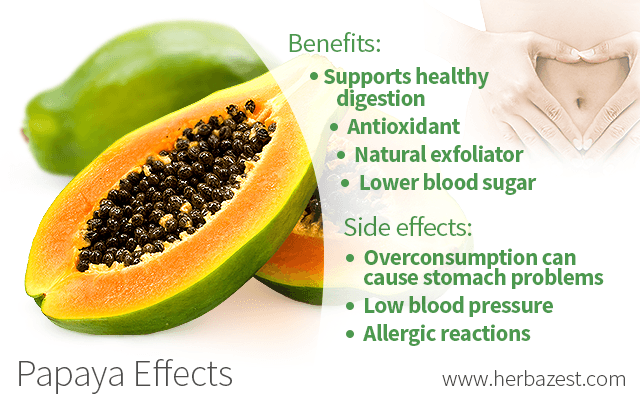Because of some of the fruit's well-known traditional uses, the effects of papaya have been more widely studied in recent years in terms of finding alternative forms of treatment for several human illnesses. So far, science has revealed many papaya benefits for human health; however, few side effects, cautions, and interactions are important to consider before adding this tropical fruit to a balanced diet.
Effects of Papaya on Gastrointestinal Health
Benefits. Papaya's latex contains papain, a digestive enzyme that breaks down proteins and supports healthy digestion by aiding nutrient's absorption. Papain can be found in dietary pills, and it is also commonly used in cooking to help tenderize meat and make it easier to pass through the digestive tract.
Downsides. Papain is most abundant in unripe, green papaya fruits. Though it acts as a mild laxative, it can be toxic, and overconsumption can cause diarrhea and other stomach problems.
Effects of Papaya on Cardiovascular Hearth
Benefits. Papaya contains vitamins C and E, both of which have powerful antioxidant effects in the body and help prevent oxidative stress that has been linked to the formation of major heart diseases, like atherosclerosis. Additionally, the papaya leaf contains the alkaloid carpaine, which lowers blood pressure by regulating heart rate.
Downsides. Papaya's carpaine content can be hazardous for individuals already suffering from low blood pressure (hypotension), increasing the risk of dizziness, fainting, or general fatigue.
Effects of Papaya on Skin Health
Benefits. Papaya fruits are active free radical scavengers that help to protect the skin from cellular damage and foster proper wound healing after trauma. In addition, papain acts as a natural exfoliator, removing dead skin cells for a visibly brighter appearance.
Downsides. Papaya skin allergies and other irritations have been noted in some people after topical applications or ingestion of papaya's flesh, skin, and latex. Common symptoms include skin redness, swelling, and itching.
Effects of Papaya on Diabetes
Benefits. Regular consumption of papaya has been shown to effectively lower blood sugar and low-density lipoprotein (LDL) cholesterol levels in the body.
Downsides. As with any other herb, interactions with prescribed drugs must be considered. Papaya may cause tremors, feebleness, headaches, or loss of vision when used concurrently with antidiabetic medication.
Effects of Papaya on Fertility
Benefits. Papaya has been linked to lowering fertility in male animal subjects, suggesting its potential as an all-natural, inexpensive alternative for male contraception.
Downsides. Research centered on papaya's effects on female fertility has been largely contradictory. While ripe papaya consumption has been shown to be safe during pregnancy, vaginal bleeding, uterine contractions, stunted growth in fetuses, and other harmful effects of papaya have been observed in animal studies with unripe papaya. These can attributed to the high latex content of the fruit in its early stages of development.
Cautions and Interactions
For most people, papaya is generally regarded as safe when consumed in normal food quantities or when taken medicinally. However, the following cautions should also be taken into consideration:
Pregnancy. Because of its high content of latex, consumption of immature, green papaya as well as papaya food products and medicinal supplements high in papain, is considered unsafe during pregnancy.
Diabetes. Caution should be exhibited when combining papaya with antidiabetic medications and other hypoglycemic herbs, such as devil's claw, ginseng, and fenugreek.
Allergic reactions. Itchy, watery eyes, scratchy throat, sneezing, and abdominal pain have been noted in individuals with latex sensitivity.
Surgery. Sometimes used as an anticoagulant agent, papaya may increase the chances of bruising and bleeding. Papaya may not be taken in conjunction with the popular anti-organ rejection drugs cyclosporine and sirolimus.
Although many individuals can attest to the positive health effects of papaya, several considerations should be kept in mind, such as proper dosage, pre-existing conditions, and potential drug contraindications. As such, it is always recommended that seek medical advice in order to assess whether papaya is right for you.
Sources
- Annals of Allergy, The incidence and clinical implications of hypersensitivity to papain in an allergic population, confirmed by blinded oral challenge, 1985
- Children's Hospital of Pittsburgh, Cyclosporine (Sandimmune, Neoral) Uses and Side Effects
- Journal of Investigative Dermatology, Papain degrades tight junction proteins of human keratinocytes in vitro and sensitizes C57BL/6 mice via the skin independent of its enzymatic activity or TLR4 activation, 2015
- Journal of Medicinal Plants Studies, Traditional and medicinal uses of Carica papaya, 2013
- National Institutes of Health, Papaya | Hypoglycemia | What is Hypotension?
- Nuts and Seeds in Health and Disease Prevention, p. 861
- Safety assessment of transgenic organisms, pp. 231-232
- The British Journal of Nutrition, Papaya (Carica papaya) consumption is unsafe in pregnancy: fact or fable? Scientific evaluation of a common belief in some parts of Asia using a rat model, 2002
- University of Michigan Health, Side effects of anti-rejection drugs
- Phytotherapy Research, Antioxidant potentials of Iranian Carica papaya juice in vitro and in vivo are comparable to a-tocopherol, 2006




